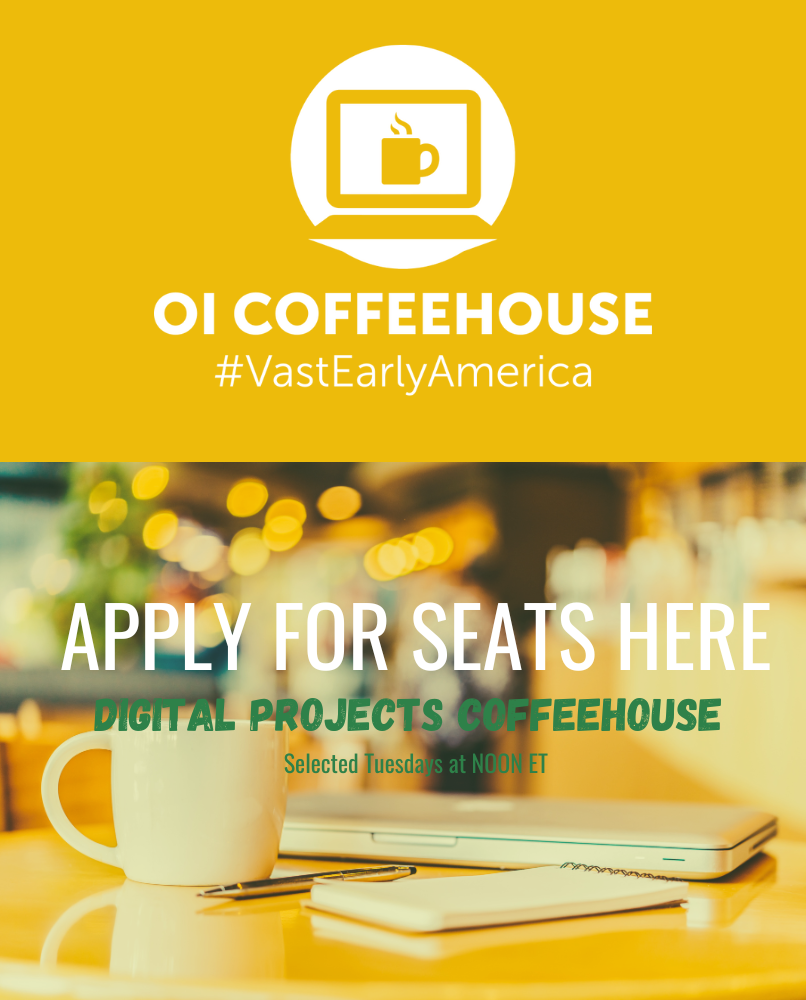
OI “Digital Projects” Coffeehouse
September 17, 2024, 12:00 pm - December 10, 2024, 1:00 pm EDT
Join us ONLINE on selected TUESDAYS at NOON ET during fall 2024 for an informal brownbag series featuring publicly available digital humanities projects.
What constitutes a Digital Humanities project?
- Digital archives
- Digital editions
- Digital public history and museum exhibits
- Digital mapping projects
- Podcasts
Join us if you want to use the project in class, learn more about the topic, or learn more about how to do a similar thing yourself.
REGISTER HERE to receive the Zoom link and reminders before each session.
Questions? Contact table hosts Martha Howard (Omohundro Institute) and James Ambuske (Co-Head of R2 Studios, Roy Rosenzweig Center for History and New Media, at George Mason University) via oieahc@wm.edu.
The fall 2024 line up includes:
September 17 – Joshua Greenberg, Omohundro Institute (Commonplace.online)
“A bit less formal than a scholarly journal, a bit more scholarly than a popular magazine, Commonplace speaks—and listens—to scholars, museum curators, teachers, hobbyists, and just about anyone interested in American history before 1900. It is for all sorts of people to read about all sorts of things relating to early American life—from architecture to literature, from politics to parlor manners.” (About)
September 24 – Simon P. Newman, University of Glasgow, emeritus, and University of Wisconsin (Freedom Seekers).
Freedom Seekers is a newly launched project with the 250th anniversary of American independence in mind. The project is comprised of blogpost length “stories” of enslaved people who escaped and were the subject of newspaper advertisements. With a particular focus on the era of the American Revolution, we hope to create a database of alternative narratives of freedom and independence. The project includes materials for instructors, and we hope colleagues will develop exercises for students to research and write their own stories/narratives.
October 8 – Elodie Peyrol-Kleiber, Université de Poitiers (Explore Engagement Law)
In addition to creating sites for public education, digital tools can be ideal for storing and sharing research. Elodie Peyrol-Kleiber has been researching indentured servitude in Vast Early America across colonies and empires for many years. She has designed an online repository for her research meant for sharing with students and colleagues.
October 22 – Stefanie Hunt-Kennedy, University of New Brunswick (Laws of Enslavement and Freedom in the Anglo-Atlantic World)
This digital archive—regularly updated with new source materials—seeks to make the laws governing slavery and freedom in the Anglo-Atlantic World (particularly the British Caribbean), from the early founding laws of the seventeenth century to the laws that governed emancipation in the nineteenth century, accessible to scholars, students, and the general public. (About)
November 19 – Rachel M. Wheeler, Indiana University Indianapolis, and Sarah Eyerly, Florida State University (Singing Box 331 and Moravian Soundscapes)
Singing Box 331 is a multi-media examination and expansion of “… hymnbooks [which] have become important cultural and linguistic records, silently preserving [a] tradition of Mohican-Moravian hymnody for more than 250 years” (Beginnings) while Moravian Soundscapes “documents and reconstructs the soundscapes of eighteenth-century Moravian communities in eastern Pennsylvania through maps, archival materials, pictures, and sound recordings.” (About)
December 10 – Ann Smart Martin and Travis Olson, University of Wisconsin-Madison
William Ramsay’s World: Accounting for Material Culture and Business in Pre-Revolutionary Virginia
This project centers on William Ramsay’s 1753-56 Alexandria, Virginia store ledgers as part of a multi-year engagement with historical evidence of global trade, mercantile practice, and retail sales to re-imagine the material culture and business of colonial America. Its core narrative is that everyday purchases at a local store are key evidence about American society and its place in global trade three centuries ago. It reconstructs consumer actions of men and women— wealthy and poor, free and enslaved, in various ages and occupations—and details that behavior in terms accessible and inviting to scholars and the public.

